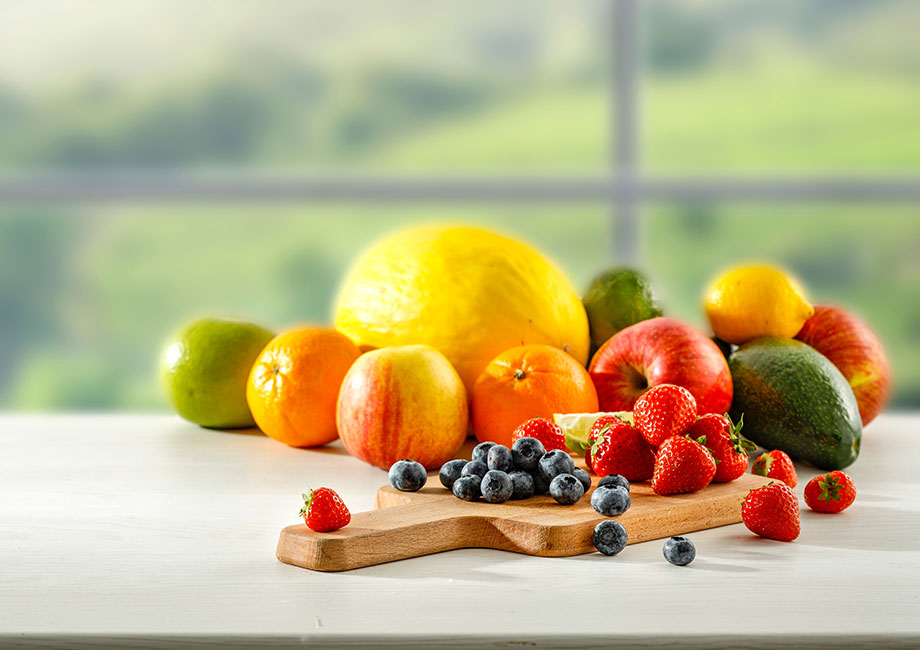We test and review fitness products based on an independent, multi-point methodology. If you use our links to purchase something, we may earn a commission. Read our disclosures.
When building muscle mass, high-protein foods are usually the first things that come to mind. And they should be! Our bodies need extra protein to create new muscle fibers when building muscle.
Compared to other nutrients, protein is the most significant in maximizing gains. However, it isn’t the only dietary component that matters.
Any dietitian—myself included—will tell you that balanced meals featuring protein-rich foods, fruits, vegetables, whole grains, and healthy fats are essential for good health and muscle growth. But for this article, I’ll focus solely on fruit and its unique role in building muscle.
So, what’s the best fruit for muscle building? As it turns out, different types of fruit offer distinct benefits. Set aside the whey protein powder and keep reading to learn which fruits to add to your meal plan!
Medical disclaimer: This article is intended for educational and informational purposes only. It is not intended as a substitute for medical advice. For health advice, contact a licensed healthcare provider.
8 Best Fruits for Muscle Building
Fruits boast antioxidants and general health benefits but aren’t very high in protein. Protein provides amino acids—aka the building blocks of muscle—so how can low-protein foods help you get ripped?
As it turns out, there are a few ways! I’ll discuss eight fruits with high carbohydrate content to help support muscle growth (and overall health).
1. Bananas
Bananas are a popular (and affordable) source of complex carbohydrates—and vitamin D for healthy bones. Carbohydrates serve as an important energy source during workouts. Without adequate carbs1, the body will start to break muscle down into amino acids and convert those into glucose, a form of simple carbs, for energy.
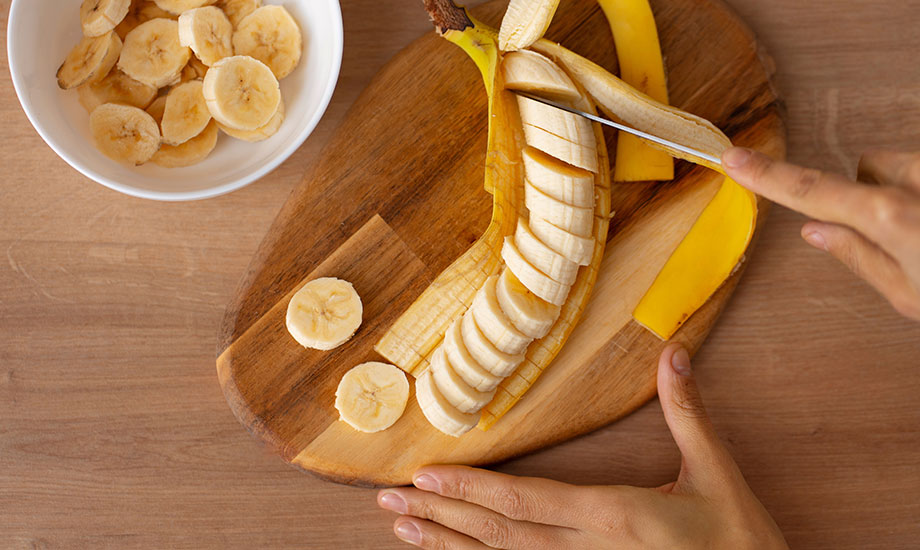
In simple terms, having carbs before a workout can help preserve the gains you’ve already made while providing you with the energy you need to power through a tough workout.
One medium banana has 26 grams of carbs, making it the perfect on-the-go snack. Bananas go well in smoothies and protein shakes, on top of oatmeal or cereal, or baked in banana muffins.
RELATED: Best Carbs for Bodybuilding
2. Dates
Dates are an even better source of carbs, with 36 grams in only two pitted dates. Besides serving as energy during workouts, carbs are also important for replenishing your muscle glycogen stores post-workout.
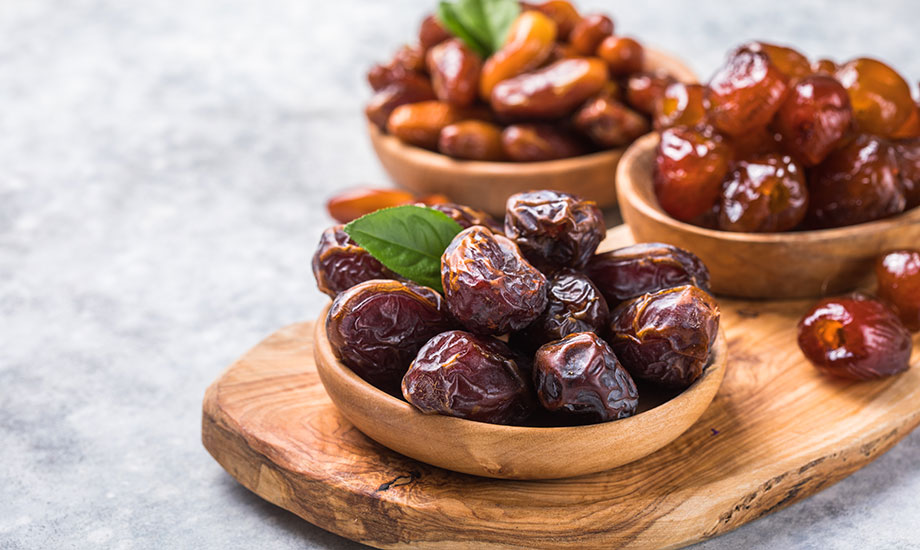
During exercise, the body prefers to use carbs from two sources: the pre-workout snack you just ate and the carbs stored in your muscle as glycogen. The longer you exercise, the more glycogen gets used up.
It’s smart to replenish your glycogen stores afterward so you don’t begin the next workout already drained.
Calcium-rich dates are great solo, but my favorite way to eat them is to stuff them with peanut butter or to sweeten protein powder smoothies or oatmeal.
3. Mango
Mangos are another higher-carb fruit with 25 grams in a one-cup serving. This tropical stone fruit is packed with potassium for healthy blood pressure levels and beta-carotene—a precursor to vitamin A—for healthy vision, trace amounts of omega-3 when ripe, and is rich in micronutrients.
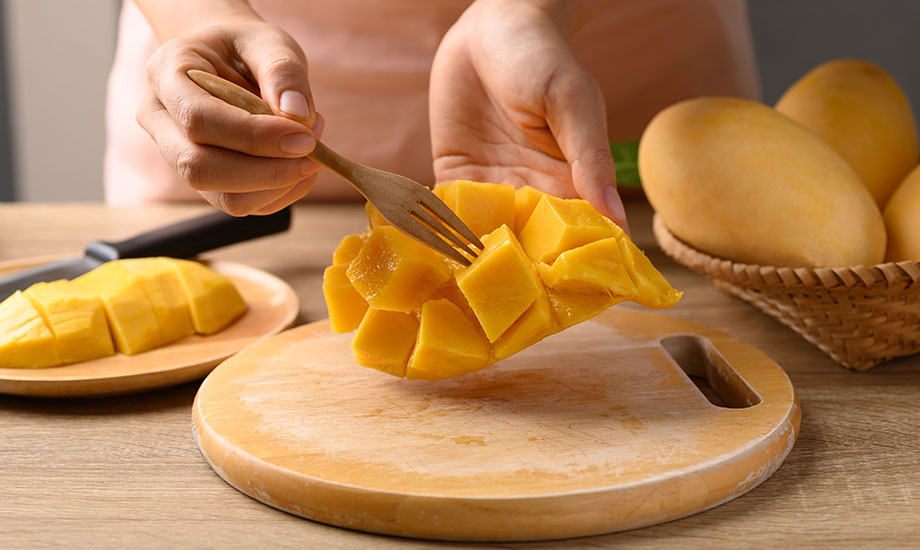
You can enjoy fresh mango slices or combine them with other tropical flavors like coconut and pineapple. Add a chile-lime seasoning blend (tajin) to your fresh mango for a delicious, sweet-and-spicy snack.
4. Avocado
Yes, avocados are fruit! Rich in monounsaturated fatty acids, these healthy fats make avocados an excellent choice for cardiovascular function. Fortunately for fitness enthusiasts, avocados also support muscle growth.
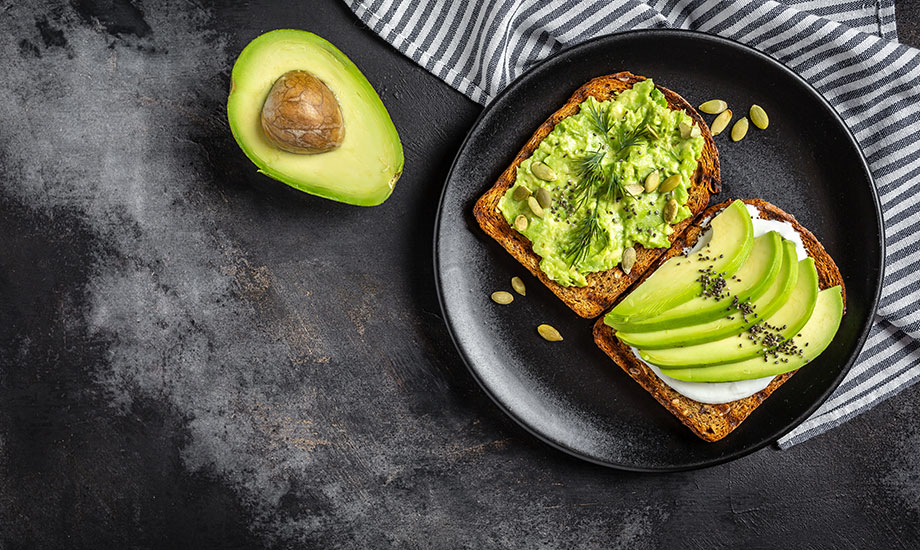
Muscle building requires extra energy, so an additional 350 to 500 calories2 per day is often recommended when your goal is to build muscle.
RELATED: How To Build Muscle
Fat has nine calories per gram, making it more calorically dense than carbs or protein, which both have four calories per gram. As a source of healthy fats, avocados are a great way to increase calories and body weight.
With their mild flavor, avocados pair well with a variety of dishes. Try them in smoothies, spread on bagels or toast or as a topping for burrito bowls and salads.
5. Guava
Guava is one the absolute best sources of vitamin C, with a whopping 375 milligrams per cup.
What does vitamin C have to do with building muscle, you ask? It doesn’t create new muscle fibers but does support healthy muscle function.
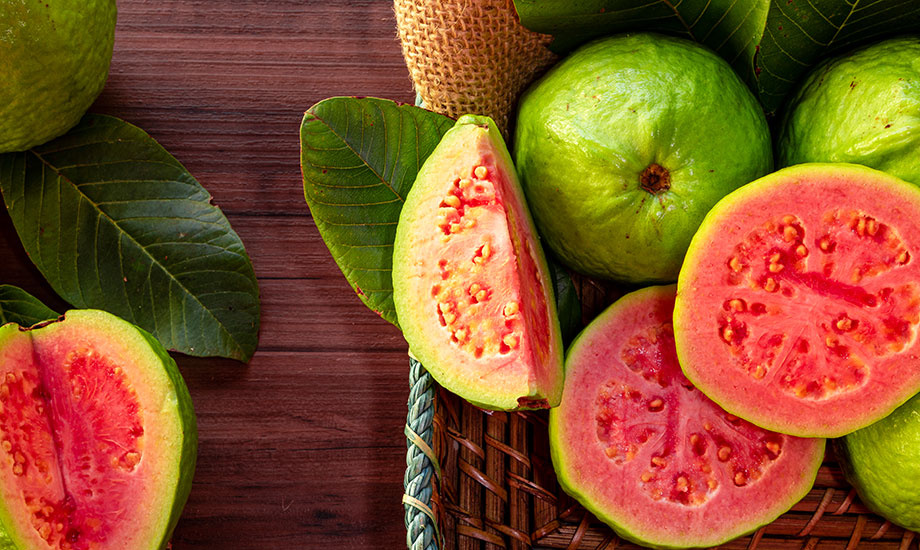
Vitamin C is a key component in your body’s production of collagen3, a protein that connects muscle cells, provides elasticity, and helps transmit forces from muscular contractions to bones. The more muscle you build, the more collagen the body will have to produce.
Fresh guava isn’t easily accessible everywhere in the U.S., but it’s delicious on its own or paired with other fruits in smoothies.
RELATED: Protein Smoothie Recipes
6. Strawberries
Like guava, strawberries are also rich in vitamin C—they provide some carbs, but their vitamin C content is where they shine.
In addition to serving as a collagen precursor, vitamin C also increases how much iron you absorb from plant-based foods.
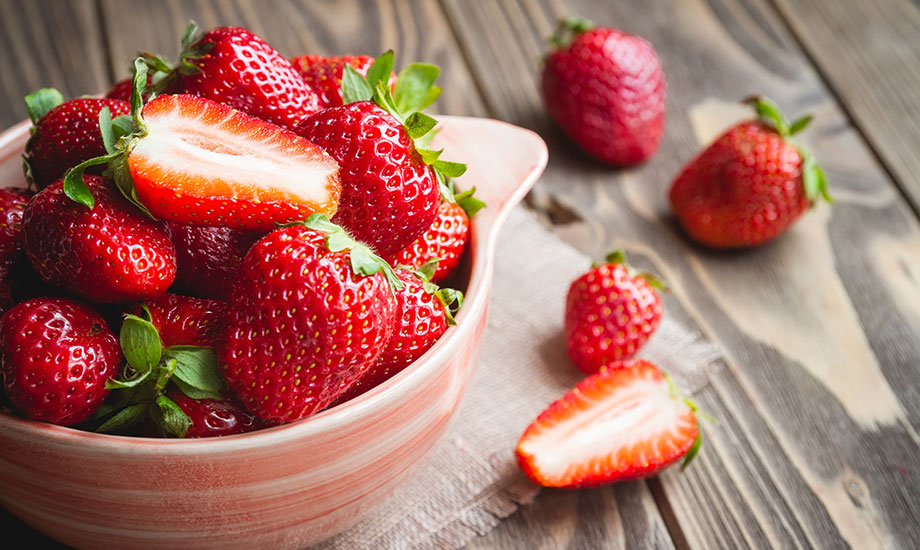
Iron is a component of myoglobin, a protein that stores and carries oxygen within the muscle tissue. Interestingly, the authors of a 2020 cell study4 suggest that iron deficiency may hinder muscle protein synthesis.
For people who struggle with low iron levels, pairing vitamin C-rich strawberries with meals can improve iron absorption, which, in turn, may help support muscle-building.
7. Dark Berries
Adding a handful of berries to breakfast quinoa or Greek yogurt is an effective way to boost your intake of polyphenols, natural plant chemicals that may assist in muscle repair.
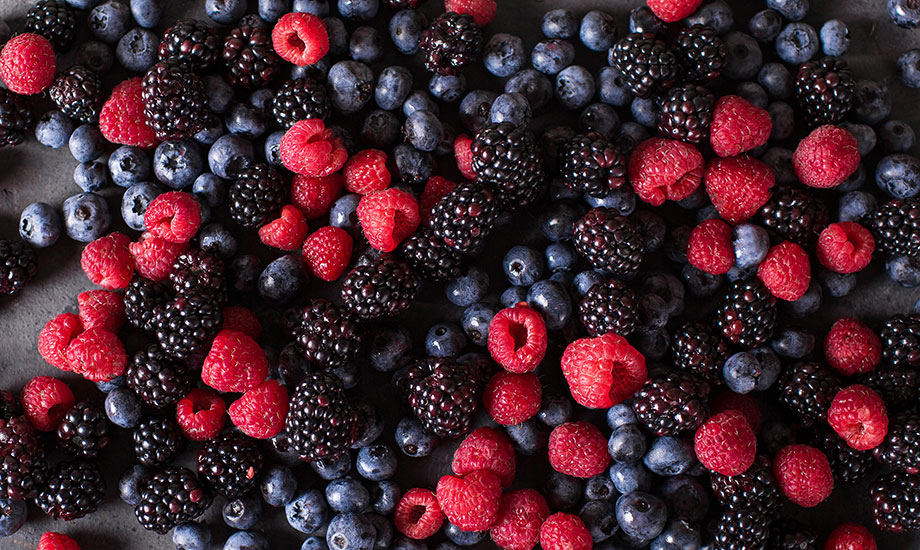
According to a 2021 meta-analysis5, polyphenol-rich foods like blackberries, blueberries, raspberries, and pomegranates may help decrease delayed-onset muscle soreness (DOMS) and accelerate muscle recovery after a workout. Improved recovery could lead to better-quality workouts and potentially improve exercise performance.
RELATED: Best Muscle Recovery Supplements
The findings were of mixed-quality evidence, but the good news is that berries are an incredibly healthy and delicious choice, even if their effects on muscle recovery are limited.
8. Watermelon
A summertime favorite, watermelon is an excellent source of electrolytes—notably magnesium and potassium—which help prevent muscle cramps.
Watermelon is associated with weight loss thanks to its high water content, but it also supports muscle-related weight gain because it’s high in citrulline—an amino acid that increases the amount of nitric oxide produced in the body.
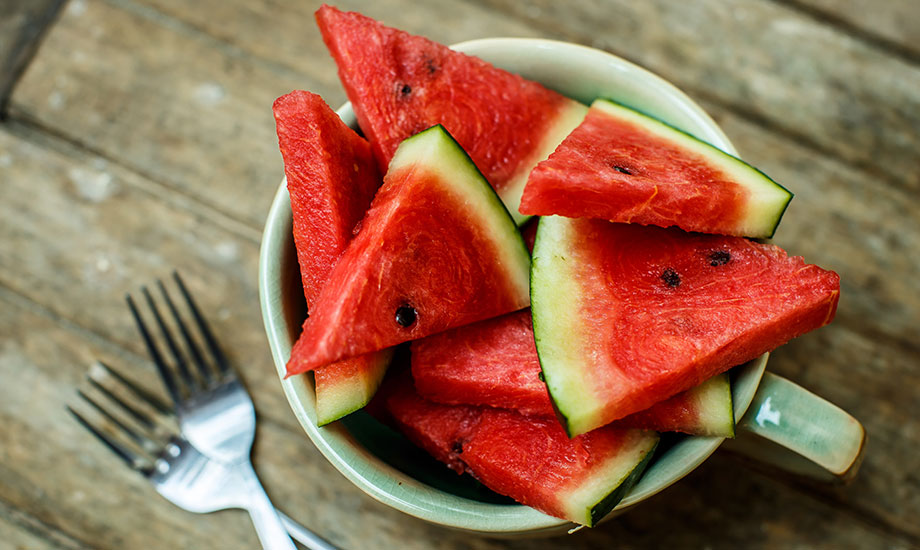
Nitric oxide is a powerful vasodilator, improving blood flow to organs, including the skeletal muscles. Better blood flow means better oxygen delivery and muscle function.
Excellent by itself, watermelon is also delicious with fresh mint or frozen and blended into a healthy sorbet.
When Should You Have Muscle-Building Fruits?
While you can have fruit any time of day, focusing on certain fruits at specific times may help you meet your fitness goals.
Morning
I’ll discuss pre-workout fruits next, so let’s assume for a minute that you aren’t working out in the morning. In this case, the following fruits would fit:
- Avocado
- Guava
- Dark berries
Avocados may be better tolerated in the morning or after a workout. As a source of healthy fats, they reduce digestion speed and absorption, which is great for a filling breakfast but may make you feel queasy if eaten too close to your workout.
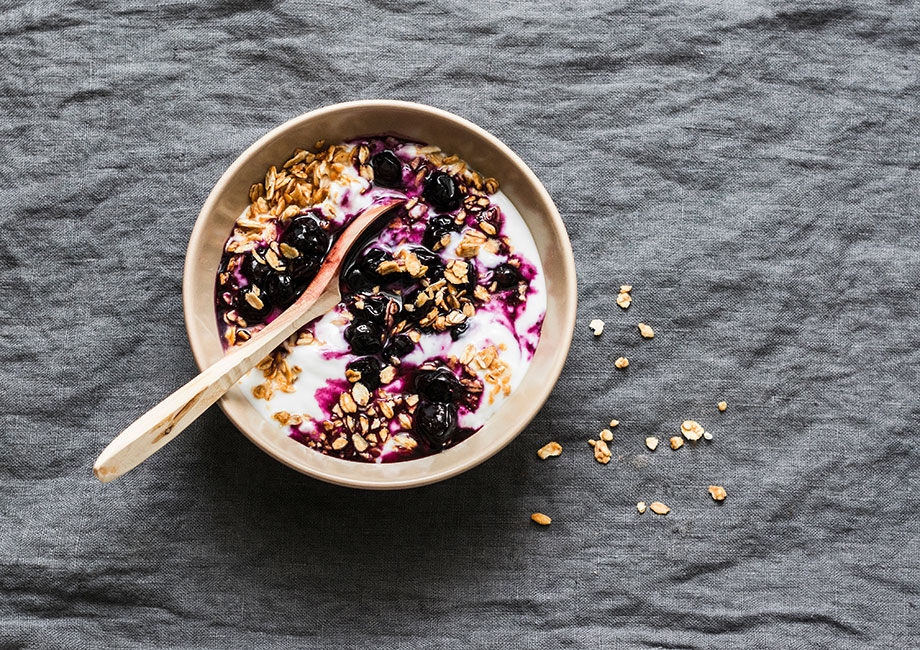
Guava, on the other hand, is high in fiber at 9 grams per cup. This is also great for keeping you full but could cause mild digestive distress during exercise. Fiber also slows down how quickly the body absorbs carbohydrates, so guava may not be the best pre-workout option.
Since dark berries are lower in carbohydrates than other fruits, they aren’t the best choice for fueling a tough training session. They can, however, provide a boost of anti-inflammatory nutrients in the morning.
RELATED: Macros for Fat Loss and Muscle Gain
Pre-Workout
For a great source of muscle-sparing energy before a workout, focus on the following fruits:
- Banana
- Date
- Mango
Of the eight options I’ve listed, these are the highest in carbs without being too high in fiber, so they’ll be easily absorbed and shouldn’t cause digestive side effects while lifting weights.
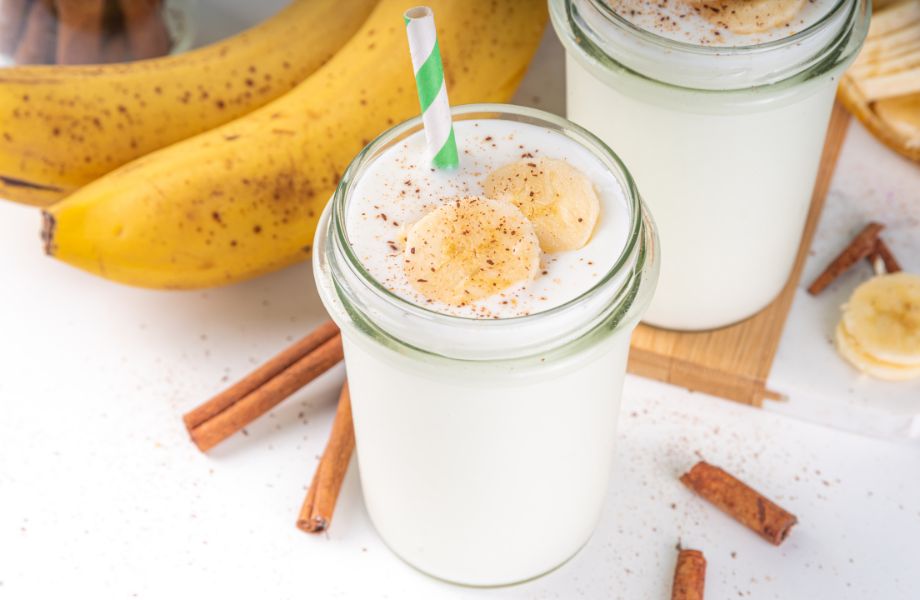
Watermelon is also low in fiber but is lower in carbs due to its high water content. It can still serve as a pre-workout snack, but you’ll need more than a typical one-cup serving.
Post-Workout
Bananas, dates, and mangos are also great for replenishing muscle glycogen after a workout. Avocado is a great way to add calories and creaminess to many post-workout meals, making them more satisfying.
If you exercise after work or in the evening, having fruit as a side at dinner or in a fruit-based dessert can provide needed carbohydrates later in the day when fruits aren’t typically as popular.
Best Fruits for Muscle Building: Final Thoughts
It may not be the best way to get more protein, but fruit can still help with your muscle-building goals because, no matter your fitness goal, eating a balanced diet that hits several food groups is vital for overall health.
Different types of fruit can help in many ways when building muscle. To summarize, fruit can:
- Serve as a muscle-sparing energy source during workouts
- Help replenish glycogen stores after a workout
- Provide your body with additional calories needed to build muscle
- Offer important vitamins, minerals, polyphenols, enzymes, and other compounds needed to support the muscle-building process
To guarantee you’re also eating a great source of protein along with the complex carbs from fruit, check out the best high-protein foods for muscle-building.
Best Fruit for Muscle Building: FAQs
Which fruit juice is best for muscle gain?
All fruit juices are similar in carbohydrate content and help support muscle-building because they provide muscle-sparing energy during exercise and help replenish muscle glycogen after a workout.
What fruit is high in protein?
No fruits are particularly high in protein, but they can help you get a few extra grams during the day. Avocado and guava are two of the highest, with three to four grams of protein per cup.
How is the healthiest fruit for bodybuilding?
The best fruit for bodybuilding depends on many factors. Fruits like bananas, dates, and mangos are good sources of muscle-sparing carbs. Avocados provide healthy fats, and other fruits like watermelon and berries have vitamins, minerals, and polyphenols that help build lean mass in indirect ways.
What fruit is good for a gym workout?
Fruits high in carbohydrates and relatively low in fiber are a great energy source during workouts. Some of the best options are bananas, dates, and mangos.
These statements have not been evaluated by the Food and Drug Administration. This product is not intended to diagnose, treat, cure, or prevent any diseases.
References
- Margolis LM, Pasiakos SM. Low carbohydrate availability impairs hypertrophy and anaerobic performance. Curr Opin Clin Nutr Metab Care. 2023;26(4):347-352. doi:10.1097/MCO.0000000000000934
- Moore DR, Philp A. Editorial: Nutritional Strategies to Promote Muscle Mass and Function Across the Health Span. Front Nutr. 2020;7:569270. Published 2020 Oct 2. doi:10.3389/fnut.2020.569270
- Holwerda AM, van Loon LJC. The impact of collagen protein ingestion on musculoskeletal connective tissue remodeling: a narrative review. Nutr Rev. 2022;80(6):1497-1514. doi:10.1093/nutrit/nuab083
- Higashida K, Inoue S, Nakai N. Iron deficiency attenuates protein synthesis stimulated by branched-chain amino acids and insulin in myotubes. Biochem Biophys Res Commun. 2020;531(2):112-117. doi:10.1016/j.bbrc.2020.07.041
- Rickards L, Lynn A, Harrop D, Barker ME, Russell M, Ranchordas MK. Effect of Polyphenol-Rich Foods, Juices, and Concentrates on Recovery from Exercise Induced Muscle Damage: A Systematic Review and Meta-Analysis. Nutrients. 2021;13(9):2988. Published 2021 Aug 27. doi:10.3390/nu13092988
Further reading
Interested in trying a popular diet program but stuck on Noom vs Weight Watchers? We asked a certified nutritionist to compare the two nutrition plans. Read more

When building muscle mass, high-protein foods are usually the first things that come to mind. And they should be! Our bodies need extra protein to create new muscle fibers when building muscle. Compared to other nutrients, protein is the most significant in maximizing gains. However, it isn’t the only dietary component that matters. Any dietitian—myself included—will tell you that balanced meals featuring protein-rich foods, fruits, vegetables, whole grains, and healthy fats are essential for good health and muscle growth. » Read more about: Best Fruit for Muscle Building: 8 Options for Natural Gains » Read more

The Titan Leg Curl / Extension Machineis a compact, plate-loaded machine that doubles as a seated leg curl and leg extension machine perfect for home gyms. The price point, features, and quality are all a step above what Titan Fitness typically offers and I recommend it if you have the space and want to pack some muscle on your quads and hammies. Read more

When building muscle mass, high-protein foods are usually the first things that come to mind. And they should be! Our bodies need extra protein to create new muscle fibers when building muscle. Compared to other nutrients, protein is the most significant in maximizing gains. However, it isn’t the only dietary component that matters. Any dietitian—myself included—will tell you that balanced meals featuring protein-rich foods, fruits, vegetables, whole grains, and healthy fats are essential for good health and muscle growth. » Read more about: Best Fruit for Muscle Building: 8 Options for Natural Gains » Read more

